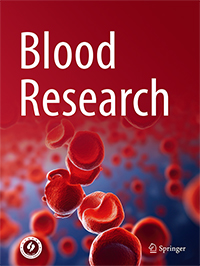Korean J Hematol 2004; 39(3):
Published online September 30, 2004
© The Korean Society of Hematology
조혈세포의 체외 증폭과 Amifostine이 미치는 영향
류현모, 배성화, 현명수
대구가톨릭대학교 의과대학 내과학교실
영남대학교 의과대학 내과학교실
Ex vivo Expansion of Hematopoietic Cells and Amifostine Effects
BACKGROUND :
The possibility of cord blood transplantation in adults was limited by the amount of cord blood that could be collected. Cord blood transplantation after ex vivo expansion with cytokines have already been tried in adults. Amifostine is a phosphorylated aminothiol that affords broad cytoprotection from the myelosuppressive effects of antineoplastic agents. The purposes of this study were to investigate expansion of progenitor and myeloid cells after ex vivo culture of mononuclear cells (MNCs) in umbilical cord blood with growth factor and characterize hematopoietic activities of amifostine.
METHODS:
MNCs were cultured and ex vivo expanded into myeloid progenitors by using hematopoietic growth factors (IL-1beta, IL-3, IL-6, G-CSF, GM-CSF, SCF, EPO) which are known to stimulate differentiation and proliferation of myeloid progenitors. MNCs exposed to the appropriate amount of amifostine for 15 min were cultured in semisolid media and harvested at 24h intervals, and then apoptosis was assessed by propidium iodide staining.
RESULTS:
Myeloid colonies were successfully produced from MNCs. Maximal expansion was obtained with the combination of IL-3+SCF+G-CSF+GM-CSF. SCF was thought to be the most important growth factor for expansion of myeloid progenitor. Pretreatment with amifostine for 15 min stimulated formation of hematopoietic colonies at clinically relevant concentrations ranging from 1 to 100microM. Increase in colony number compare to control were comparable after pretreatment with amifostine (10microM), and CFU-GEMM and BFU-E were highly responsive. Further enhancement of colony was not observed after prolonging the duration of pre- incubation exposure to 1, 8 and 24 hours. Amifostine enhanced IL-1 and IL-3 induced formation of CFU-GEMM and BFU-E. Incubation of MNCs with amifostine in suspension culture increased recovery of secondary colonies. Treatment with amifostine retarded cell loss and apoptosis, and promoted cell survival at 24, 48 and 72 hours in cytokine-deficient medium.
CONCLUSION :
Cord blood MNCs can be successfully expanded into myeloid progenitors by using hematopoietic growth factors. This investigation extend the previously recognized hematologic effects of amifostine, and indicate that in addition to its cytoprotective properties, amifostine is a stimulant of hematopoietic progenitor growth.
Keywords Cord blood cells, Ex vivo expansion, Amifostine
Article
Korean J Hematol 2004; 39(3): 158-166
Published online September 30, 2004
Copyright © The Korean Society of Hematology.
조혈세포의 체외 증폭과 Amifostine이 미치는 영향
류현모, 배성화, 현명수
대구가톨릭대학교 의과대학 내과학교실
영남대학교 의과대학 내과학교실
Ex vivo Expansion of Hematopoietic Cells and Amifostine Effects
Hun Mo Ryoo, Sun Hwa Bae, Myung Soo Hyun
Department of Internal Medicine, Daegu Catholic University College of Medicine, Daegu, Korea
Yeungnam University College of Medicine, Korea
Abstract
BACKGROUND :
The possibility of cord blood transplantation in adults was limited by the amount of cord blood that could be collected. Cord blood transplantation after ex vivo expansion with cytokines have already been tried in adults. Amifostine is a phosphorylated aminothiol that affords broad cytoprotection from the myelosuppressive effects of antineoplastic agents. The purposes of this study were to investigate expansion of progenitor and myeloid cells after ex vivo culture of mononuclear cells (MNCs) in umbilical cord blood with growth factor and characterize hematopoietic activities of amifostine.
METHODS:
MNCs were cultured and ex vivo expanded into myeloid progenitors by using hematopoietic growth factors (IL-1beta, IL-3, IL-6, G-CSF, GM-CSF, SCF, EPO) which are known to stimulate differentiation and proliferation of myeloid progenitors. MNCs exposed to the appropriate amount of amifostine for 15 min were cultured in semisolid media and harvested at 24h intervals, and then apoptosis was assessed by propidium iodide staining.
RESULTS:
Myeloid colonies were successfully produced from MNCs. Maximal expansion was obtained with the combination of IL-3+SCF+G-CSF+GM-CSF. SCF was thought to be the most important growth factor for expansion of myeloid progenitor. Pretreatment with amifostine for 15 min stimulated formation of hematopoietic colonies at clinically relevant concentrations ranging from 1 to 100microM. Increase in colony number compare to control were comparable after pretreatment with amifostine (10microM), and CFU-GEMM and BFU-E were highly responsive. Further enhancement of colony was not observed after prolonging the duration of pre- incubation exposure to 1, 8 and 24 hours. Amifostine enhanced IL-1 and IL-3 induced formation of CFU-GEMM and BFU-E. Incubation of MNCs with amifostine in suspension culture increased recovery of secondary colonies. Treatment with amifostine retarded cell loss and apoptosis, and promoted cell survival at 24, 48 and 72 hours in cytokine-deficient medium.
CONCLUSION :
Cord blood MNCs can be successfully expanded into myeloid progenitors by using hematopoietic growth factors. This investigation extend the previously recognized hematologic effects of amifostine, and indicate that in addition to its cytoprotective properties, amifostine is a stimulant of hematopoietic progenitor growth.
Keywords: Cord blood cells, Ex vivo expansion, Amifostine

Article Tools
Stats or Metrics
Related articles in BR
-
Ex vivo Expansion of Cryopreserved Cord Blood Cells
Samyong Kim, Chu Hee Kim, Gwang Bong Bae, Hyun Soo Kim, Sang Jun Park, Jong Suk Kim, Hwan Jung Yun, Deog Yeon Jo
Korean J Hematol 1997; 32(3): 347-359 -
Elevated expression of DNMT1 is associated with increased expansion and proliferation of hematopoietic stem cells co-cultured with human MSCs
Moharram Ahmadnejad, Naser Amirizadeh, Roya Mehrasa, Ahmad Karkhah, Mahin Nikougoftar, and Arezoo Oodi
Blood Res 2017; 52(1): 25-30 -
Ex vivo Expansion of Hematopoietic Progenitor Cells in Co-culture of Cord Blood CD34+ Cells with Human Umbilical Vein Endothelial Cells
Jin Hee Hwang, Seong Woo Kim, Jae Min Chun, Nam Suk Park, Sang Eun Park, Soo Jin Park, Hwan Jung Yun, Deog Yeon Jo, Samyong Kim
Korean J Hematol 2004; 39(3): 149-157




 PDF
PDF Standard view
Standard view Export citation
Export citation Share
Share  Previous Article
Previous Article



